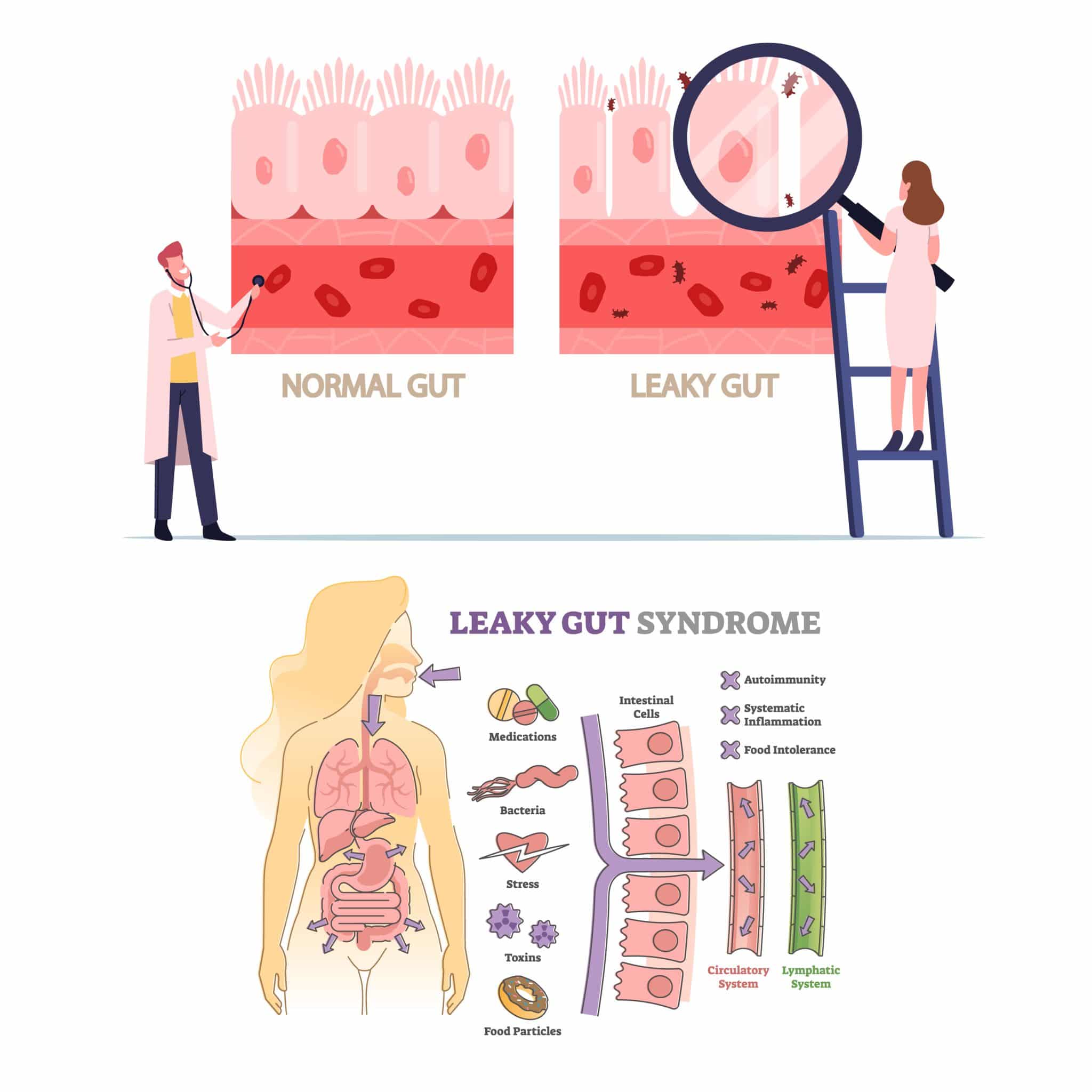Altering the Microbiome for Weight Loss
 Have you put on a few extra pounds since quarantine? Or maybe weight has been something you’ve always battled with maintaining? Well, today we are going to talk about why there might be more to weight loss than we originally thought — and how gut microbes might be the key to busting through your weight plateaus.
Have you put on a few extra pounds since quarantine? Or maybe weight has been something you’ve always battled with maintaining? Well, today we are going to talk about why there might be more to weight loss than we originally thought — and how gut microbes might be the key to busting through your weight plateaus.
Weight loss isn’t easy, and anyone who has tried to lose those extra pounds knows how much work and dedication goes into losing weight. But pushing through those difficult plateaus can be disheartening and often derails the progress you’ve made.
A lot of this is being linked to gut microbiome disturbances. In this article, we will provide you with the studies being done on how the gut affects your weight loss journey and how you can try to improve it by modifying your microbes.
So, first things first…
Why is gut health important when it comes to weight loss?
The gut is considered your second brain and controls so much of how your body runs. The gut breaks down your foods causing chemical reactions to happen all throughout your body. These chemical reactions control each process that is required for you to be happy and healthy.
But when the balance within your gut microbiome is disturbed, the chemicals being sent out are unhealthy and wreak havoc on everything in our bodies. This is a phenomenon called dysbiosis and it happens very easily.
From the time you’re being shaped in your mother’s womb, your microbiome starts being developed, and everything you come into contact with helps to make it more or less robust.
Antibiotics are a major part of the destruction of the microbiome. Studies show that children who are exposed to antibiotics in infancy are predisposed to diabetes, obesity, and other diseases. These children also often weigh more than their peers who were not exposed to antibiotics.
Antibiotics are a major focus when it comes to seeing what gut health effects are because they create a more sterile environment in our guts. This then allows researchers to see the difference between health with a sterile gut and a microdiverse gut.
The different microbes that inhabit our gut all have their own individual chemical makeup. They possess different abilities when breaking down our foods and releasing chemicals from each food.
A microdiverse microbiome gives off healthy chemicals that maintain healthy function and control our appetite and self-control.
A microbiome that is in a state of dysbiosis will send the wrong chemical signals which cause:
- Craving unhealthy foods
- Increased inflammation throughout the body
- Organ malfunction
- Disease
- Mood dysregulation
All of these things, contribute to weight gain and make it hard to lose weight and keep it off.
Leaky Gut and Weight Loss Resistance
 When your intestinal lining is permeable it causes systemic inflammation. This is commonly referred to as having a leaky gut. This inflammatory state actually promotes:
When your intestinal lining is permeable it causes systemic inflammation. This is commonly referred to as having a leaky gut. This inflammatory state actually promotes:
- Weight gain
- Difficulty losing weight
- Cravings
- Poor mood and motivation to lose weight or make healthy choices
To help heal your leaky gut you’ll want to be eating foods that have:
- Prebiotics— feed the good bacteria to allow them to replicate and release postbiotics
- Probiotics— strains of bacteria added right into your gut (can be dangerous for some people but are generally considered safe)
- Postbiotics— SCFA and other chemicals that are a result of the fermentation process to help heal cells and promote health
If you’re looking to lose weight fast without so much guesswork, ask your doctor to test your microbes and you’ll be able to work on improving specific ones with diet and lifestyle changes.
What microbes are the best for altering the microbiome for weight loss?
Understanding how your gut is currently set up and how you can work to improve it to promote weight loss includes understanding each specific strain of bacteria, what they do to promote weight loss, and how to work with them instead of guessing.
Some of the species of microbes that have a hand in determining how quickly you can lose weight are:
- Prevotella
- Christensenella minuta
- Turicibacter
- Akkermansia muciniphila
Each of these species affects weight loss differently, but they’re all important and can work synergistically to help you crash through those plateaus.
Prevotella
High levels of Prevotella species help you lose weight when on a whole grain and high fiber diet as opposed to a refined wheat diet. Conversely, if you have low Prevotella levels eating a refined wheat diet will help you drop pounds quicker.
Knowing the construction of your microbiome will help you to determine the best diet plan for you to follow to support your goals.
Christensenellaceae
Christensenellaceae bacteria appear to be a heritable bacteria strain. This means that people who live in the same area, are exposed to the same environmental products, eat similar foods, and have similar habits will often dictate if this bacterial strain is present in your gut. However, just because one family member has it doesn’t mean that others will.
People who have this strain of bacteria seem to lose weight and maintain that weight loss better than those who do not have it. Also, more active and leaner people tend to have Christensenellaceae in their guts. Diets that are low in refined sugars and high in fruits and vegetables have been associated with higher Christensenellaceae levels.
Turicibacter
Turicibacter was associated with reducing diet-related inflammation allowing the intestinal barrier to repair itself for increased bodyweight reduction.
Akkermansia muciniphila
Akkermansia muciniphila was found to be higher in those who are following a calorie restriction diet. It is associated with healthy changes in the metabolic status and is a good indicator of the gut being on a healthy track. The studies done didn’t necessarily show a decrease in body fat percentages, but did for improved metabolic function which is healthy in the promotion of weight loss and a decrease of metabolic diseases like diabetes and obesity.
- muciniphila can be increased through supplementation and diet. Some supplements that can help improve A. muciniphila are metformin, prebiotics, and probiotics. Rhubarb and rhubarb extract, cranberry, and concord grapes are able to increase the presence of A. muciniphila as well. Avoiding high-fat diets, alcohol, and excessive amounts of food can help to increase A. muciniphila in your gut.
How to improve gut health to promote weight loss
 Once your doctor conducts fecal testing to determine the health status of your microbiome, you can go about trying to promote healing it. Some of the best ways to improve your gut health are:
Once your doctor conducts fecal testing to determine the health status of your microbiome, you can go about trying to promote healing it. Some of the best ways to improve your gut health are:
- Moderate exercise 3-5 times a week
- Keep a healthy sleeping routine
- Stop eating a few hours before bedtime
- Introduce fasting into your routine (as long as it is doctor approved)
- Fecal microbiota transplantation — this process has been tested on twins (one lean and one obese) and when the fecal microbiota was transplanted into the gut of the obese twin they were able to lose weight much quicker
- Take Atrantil — Atrantil has prebiotics and postbiotics that help to heal the intestinal lining, reduce inflammation, and increase healthy bacterial species in the gut
Losing weight can be difficult, especially with all of the conflicting information out there. Talking with your medical professional and asking about how to improve your gut health to improve everything else can be the best first step you can take. What has helped you to lose weight and what has seemed to inhibit it? Let us know in the comments below!
- https://www.nature.com/articles/476393a
- https://pubmed.ncbi.nlm.nih.gov/27616451/
- https://www.ncbi.nlm.nih.gov/pmc/articles/PMC7463616/#sec4-microorganisms-08-01246title
- https://academic.oup.com/jn/article/149/12/2174/5556053
- https://academic.oup.com/jn/article/149/12/2083/5580874
- https://bmcbiol.biomedcentral.com/articles/10.1186/s12915-019-0699-4
- https://www.nature.com/articles/s41591-019-0495-2
- https://www.ncbi.nlm.nih.gov/pmc/articles/PMC6223323/#S12title
- https://www.ncbi.nlm.nih.gov/pmc/articles/PMC3829625/